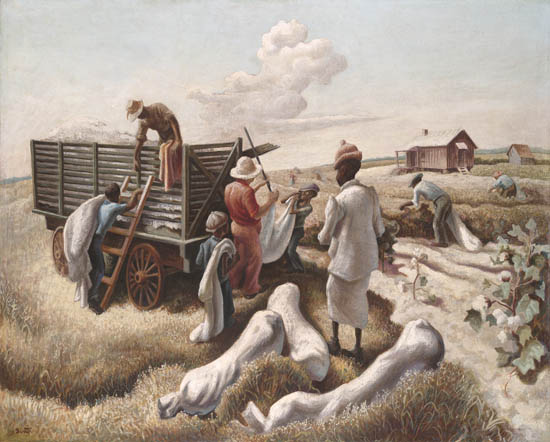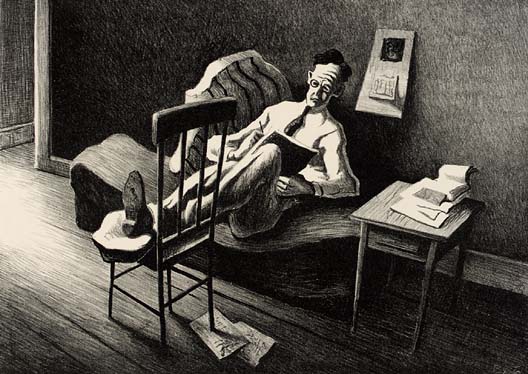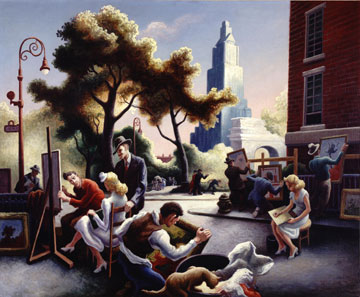![]()
The Charlotte News
Thursday, September 22, 1938
FIVE EDITORIALS
![]()
![]()
Site Ed. Note: The incompetent man who painted these pictures couldn't teach art in the public schools of New York City. What us worry. Can't do, teach; can't teach, write; can't write, paint...



![]()
Anyhow, It's Fair Time
Sun-warmed slopes of Carolina counties at this season prickle and billow with crops of cotton, clover and hay, a good promise, soon to be celebrated in many a county fair. In Cleveland, for instance, enormous bounty will be spread in rich display in the largest county fair in the state. In Mecklenburg, our own county fair will go the limit, and if we place most of the emphasis on girls and hoop-la, merry-go-things and bang-bang, why, that's all right too. It's been a good thing to make noise about the harvest since the time of the Pharoahs.
Meantime, as we work up a drowsy, well-fed pride in having stored up enough food against the Winter, we read in the paper that the farmer's purchasing power will be about nine per cent less this year. We see by the papers that we, you and I, are the nation's Economic Problem No. 1. We shudder at a criminal rate for the South that's appalling. We observe that half our people are under housed, and even in the cities, live in battered slums. A discouraging series of pictures.
But, you know, those ideas seem so much dreary paperwork when we look out from the tower, over the bosomy slopes of Mecklenburg, Union, York, Cleveland, Gaston, Lincoln--burgeoning counties all. And practically all of them getting ready for fairs.
![]()
A Man Incompetent
Mr. Thomas Benton couldn't pass the examinations to teach art in high schools of New York City. Mr. Benton is said by competent critics of the arts to be one of the two or three greatest living American painters, as you may see for yourself by consulting some such easy-reading treatise as Craven's "Men of Art." His murals in Detroit and New York have been hailed, indeed, as being among the best produced by moderns anywhere. But Mr. Benton, as the reporters found by trying it on him, couldn't pass the test which anybody has to pass to teach art in the schools in Manhattan.
Dr. Albert Einstein, it has been pointed out, too, couldn't get a job teaching mathematics in high schools of New York--or North Carolina, for that matter. And though we aren't positive about it, we bet you that Dr. Howard Odum, probably the greatest of living American sociologists, couldn't get a job teaching sociology to the high school seniors of Tarheelia, either.
Trouble with all these men is that they haven't had Education 154, 276, 3,450, 15,692 and 40,228. And the bureaucrats who run our schools won't let you have a job unless you have had them too, and practically all the rest that go before and after them. And what may these courses be? Overwhelmingly and for the main courses in bumble-fuzzle, invented by bureaucrats called Professors of Education, apparently for the express purpose of seeing that our teachers haven't time left to learn anything about the things they are actually supposed to teach.
![]()
Man Who Saved Europe
The appalling stupidity of Mr. Bumble's settlement of the Czechoslovakian trouble becomes clearer with every passing hour. The controlled British radio and press is bombarding the United States with propaganda designed to persuade us that the "settlement" is after all only just in that it merely gives a minority, the Sudetens, the "right of self-determination." But--already Adolf Hitler is throwing off the mask, and openly confessing again what he has trumpeted from the day "Mein Kampf" saw publication, that he means to take the whole of Czechoslovakia immediately. Where is "the right of self-determination" now?
And today old Bumble, the successor of Pitt and Disraeli and Lloyd George and the keeper of the tradition of Horatio Nelson, gives back to the little house-painter, bearing his same old silly scheme for "order" and a "pact" for "peace" between England, France, Germany, and Italy. To the little house-painter, who already through his stooge newspapers is shrieking his hysterical delight in having destroyed the pride of Britain and France, and announcing to the world that he does not mean to "negotiate" for a moment but merely to dictate his terms. To the house-painter who already shows his contempt for "order" by sending his storms troops to take Sudetenland by force though the Czechs have capitulated, and for "pact" by boldly proclaiming his intent at once to take over the oil and wheat fields of Rumania and dove-tail the Rumanian economy with the German.
More and more it emerges that what Bumble has actually done is to destroy Czechoslovakia, deprive the Allied side of the Czechoslovakian Army and defenses and hand Central Europe to Hitler on a platter--to make the fellow immensely strong for the coming war--without even postponing the necessity for that war more than a few weeks or months at best.
![]()
Tit for Tat
The Southeast's improving industrial situation is one thing or another, and we have James W. Hook, president of the New England Council, as authority for that. Discussing us as a magnoliaed peril, sezzee--
"For the South to expand its industrial activity upon the base of its own wealth of mineral, agricultural and other natural resources, is one thing. For her to expand by making it necessary for Northern industries to go out of business or move South because of subsidies or other special considerations, direct or indirect, is quite another."
In the notion that only by artificial aid did New England ever come to be a citadel for the manufacture of the South's cotton, let's try saying the thing this way:
For New England to have expanded its industrial activity on the base of its own wealth of mineral, agricultural or other natural resources is one thing. For her to have expanded on the base of tariff subsidies and protection, and to continue to expand on the special consideration of lower freight rates, is... quite... another!
![]()
The Epic of Dr. Crowell*
An epic in Southern medicine was the life of Dr. Andrew Johnson Crowell, which began on a Union County farm two years after the Civil War and ended yesterday in a Charlotte hospital room. This beginning and this end, the span of 71 years, comprehended one of the most remarkable medical careers and emergence of one of the most admirable personalities of our times.
The career, apart from the personality, divides itself into four distinct phases. What it meant to be born on a North Carolina farm early in Reconstruction, all men with any sympathetic imagination will understand at once. It meant, for one thing, struggle merely to survive, to exist from one season to the next, yet, somehow, by patient persistence, this farm boy managed to acquire enough education to qualify as a teacher in a rural school. And somehow after that, in all probability by hoarding his slender salary and enduring agonizing delays, the young teacher became a student again at last, a student of medicine.
They turned them out quickly in those days, for medicine was an expanding science and much that is in the great books for medical students to master now was discovered and written there by Dr. Crowell's generation. At any rate, he obtained his degree and his license, and hung out his shingle in China Grove. And then began the process that was to distinguish him and give him eminence, and was as well to bring medical eminence to his region.
A man of less vision and ambition would have been fully satisfied at the progression from farm boy to doctor: accredited by his profession and with an increasing practice. Not this man. To New York he went in his thirties for post-graduate work and at 40 he set sail for Europe to attend clinics in the centers of medical learning at London, Paris, Vienna, Berlin. He returned to found the Crowell Clinic, to become a fellow in the learned colleges and societies to which ability was the only credential to continue his studies unremittingly, and to bring medical eminence to North Carolina which it notably lacked, and which it has acquired since as much because of Dr. Crowell as perhaps any other single factor.
There you have it: from farm boy to a place of great distinction in his profession, unaided, undaunted, unchanged. For with it all he remained the kindly, courteous, helpful physician, his roots in the soil, his heart with friends and his family, his vision far and keen and his interests in service to his human kind. Truly this life was an epitome of all that is best and stanchest in man, a shining example to be cherished.
![]()
Framed Edition
Links-Date -- Links-Subj.